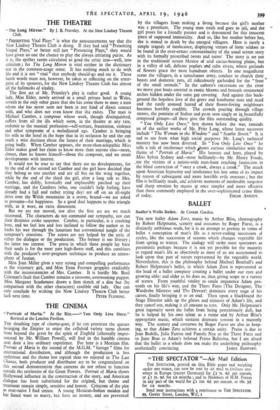THE THEATRE
" The Long Mirror." By J. a Priestley. At the New Lindsey Theatre Club.
" PRESENTING Vital Plays " is what the announcements say that the New Lindsey Theatre Club is doing. If they had said "Presenting
Vorpal Plays," or better still just ' Presenting Plays," they would have given no one the chance to play the always irritating purist. As it is, the epithet seems calculated to goad the critic into‚ÄĒwell, into
criticism ‚ÄĘ for The Long Mirror is vital neither in the dictionary nor in the common-usage sense. It has nothing much to do with life and it is not " vital" that anybody should-go and see it. These harsh words must not, however, be taken as reflecting on the enter- prise of its sponsors, for the New Lindsey Theatre Club has almost all the hallmarks of vitality.
The first act of Mr. Priestley's play is rather good. A young lady, Miss Elder, newly arrived in a small private hotel in Wales, reveals to the only other guest that she has come there to meet a man whom she has never seen nor been in any kind of direct contact with, and who does not even know that she exists. The man is Michael Camber, a composer whose work, though distinguished, suffers from all the ills which seem, in the theatre at any rate, endemic to the musical profession‚ÄĒself-torture, frustration, violence and other symptoms of a maladjusted ego. Camber is bringing his wife to the hotel in the hope that in its seclusion he and she can reach a wise decision about the future of their marriage, which is going badly. When Camber appears, the more-than-telepathic Miss Elder makes good her claim to know more than anyone else‚ÄĒmore, almost, than he knows himself‚ÄĒabout the composer, and we await developments with interest.
It would not be true to say that there are no developments, for by the end of the second act Camber and the girl have decided that they belong to one another and are all but on the wing together, while by the end of the third the girl, after a long talk to Mrs. Camber, has deftly, heroically and implausibly patched up their marriage, and the Cambers (who, one couldn't help feeling, have already had a full and rather trying day) are off on an all-night drive over the Welsh mountains in a- storm, bound‚ÄĒwe are asked to presume‚ÄĒfor happiness. So a good deal happens to this triangle with, as it were, an extra dimension.
But we are not moved, nor after the first act are we much interested. The characters . do not command our sympathy, nor can their destinies evoke suspense. Camber, in particular, is a crashing bore, and we feel less and less inclined to follow the author as he hacks his way through the luxuriant but conventional jungle of the composer's emotions. The actors are not helped by the style of either the dialogue or the production. The former is too literary ; the latter too intense. The prose in which these people lay bare their souls is for the most part high-flown stuff, and this combines with the producer's over-pregnant technique to produce an atmos- phere of fustian.
Miss Joan Miller gives a very strong and compelling performance as the visionary girl, and Miss Ilona Ference grapples creditably with the inconsistencies of Mrs. Camber. It is hardly Mr. Basil Coleman's fault that Camber remains a tiresome, overweening puppet. Miss Margaret Scudamore draws a firm sketch of a dim but (by comparison with the other characters) credible old lady. One can only conclude by wishing the New Lindsey Theatra Club better






























 Previous page
Previous page